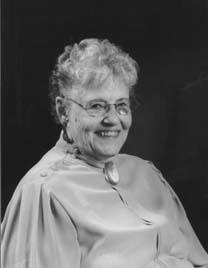ALICE GEISLER RAFTARY '49 '67
 It would seem that raising eight children would keep Alice Raftary tied down. But it didn't. Raftary continued to contribute her time and energy to many worthy causes simply by orchestrating a variety of volunteer activities for her children.
It would seem that raising eight children would keep Alice Raftary tied down. But it didn't. Raftary continued to contribute her time and energy to many worthy causes simply by orchestrating a variety of volunteer activities for her children.
"We worked at Deaf-Blind Club meetings as interpreters, provided respite care for the parents of disabled children, delivered meals to the homebound elderly and drove visually impaired rehabilitation teachers to their clients' homes," says Mary Alice, Raftary's daughter. "This early training has resulted in a group of adults who continue to volunteer and who provide similar experiences for their own children."
Raftary is proud of this accomplishment. "It is said that you know what kind of job you've done raising your own children when you see how your grandchildren are being raised," she said. "My husband, Ray, and I are blessed!"
During her last pregnancy, the macular degeneration that Raftary first experienced in high school caused a substantial loss of vision, and she became legally blind. That event rekindled her college interest in the field of blindness. So, while still a full-time homemaker, she returned to Marygrove on a grant from the Vocational Department of the State of Michigan and in 1967 earned a master's degree in Education.
Her post master's work included a traineeship with the deaf-blind at the Anne Sullivan Macy Service, Industrial Home for the Blind in New York, and course work in opthamology and counseling at Wayne State University. Her career as a rehabilitation teacher at the Greater Detroit Society for the Blind began in 1968. This followed professional positions at St. Joseph Mercy Hospital in Ann Arbor, and in Detroit at Mercy College, Mount Carmel School of Nursing, and the Rehabilitation Institute, Inc.
Throughout her career Raftary has presented at hundreds of conferences and workshops on the topics of working with the deaf-blind population, insulin management, psycho-social aspects of blindness, funding sources, rehabilitation, and aging as it relates to blindness. Raftary also authored several educational publications and produced audio-visual materials about blindness and diabetes. The audio filmstrip, "Valentines for Grandpa Raub," won the Creative Excellence Award at the International Industrial Film Festival in 1980. Her publication, "Assessment of Rehabilitation Student During Initial Contact With the Teacher," continues to be used as a model in two university rehabilitation teacher programs. Additionally, Raftary's contributions in the field of blindness were recognized with her induction last year into the Hall of Fame for Leaders and Legends in the Blindness Field.
Though her professional credits are impressive, people who know her say it is her accomplishments as a human being and friend that are truly impressive.
"She is timeless and without boundaries. She pursues friends of all ages and races. She doesn't see handicaps, only possibilities," says her friend, Laura Janinika-Rust. "The list of people she touches continuously grows."
Her daughter agrees. "My mother taught us that we were part of a much larger community. As a family we tended to collect friends from every place imaginable. Everyone was welcome in our home and became part of our already large family," she said.
"My passion is people, whether they are friends and relatives, acquaintances and strangers individually and in crowds people in all their marvelous similarities, differences and graces," said Raftary.
Raftary lovingly shares her passion for reading. She spends hours reading aloud to one class after another in schools all over the metropolitan area, adding props and songs to fit the chosen theme. And though both are retired, she and her husband Ray, married 53 years, continue to devote their holidays to work with Holiday Meals on Wheels.
Raftary credits Marygrove for providing her with a bit of wisdom that she would like to share with college students today. "A liberal education is the strong support underlying competence. Information is not knowledge. Information must be examined, judged and integrated by a trained and honest mind."
